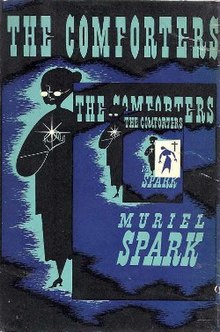Caroline found the true facts everywhere beclouded. She was aware that the book in which she was involved was still in progress. Now, when she speculated on the story, she did so privately, noting the facts as they accumulated. By now, she possessed a large number of notes, transcribed from the voices, and these she studied carefully. Her sense of being written into the novel was painful. Of her constant influence on its course she remained unaware and now she was impatient for the story to come to an end, knowing the narrative could never become coherent to her until she was at last outside it, and at the same time consummately inside it.
Caroline Rose begins to hear voices, speaking in unison, along with the clacking sound of a typewriter. The voices seem to be describing what Caroline is doing, including descriptions of her own inner thoughts. She realizes, after a crippling anxiety that she's going mad, that she is a character in a novel, and the voice she hears is the author, writing about her.
It's a vexing experience, being in a novel. For one, it doesn't feel very good to think that your actions are predetermined by someone else. Caroline does her best to thwart the heavy hand of her novelist. When she hears that she is going to visit her boyfriend Laurence's grandmother by car instead of train, she insists on taking the train, to assert a little bit of her free will. But at the last minute she realizes that it's a holy day of obligation, and she's got to go to mass--she's a recent convert to Catholicism--and so, just like the novelist wrote, she ended up taking the train. She refuses to engage with Laurence's belief that his grandmother, Louisa, is part of a diamond smuggling ring, because the whole story seems to plotty, too much like a novel. (The novel opens with Laurence finding a set of diamonds baked into a loaf of bread--an image that might have come from a Dashiell Hammett novel, if it weren't so obviously from a Muriel Spark novel instead.)
I have said as much before: it's not much of a stretch to think of every Spark novel as a meditation on the parallels between the author and God. Caroline's struggle to assert her free will in defiance of the novelist writing about her is an image of the Catholic who goes about acting as a free agent in their life even while suspecting that they have no control at all. The title, The Comforters, is taken from the story of Job: those who indulge what they see as Caroline's delusions are, in Spark's view, like the comforters in the story who fail to help Job assuage the intense pain of being the object of God's machinations.
It's also a story about belief. Spark draws a connection between several of the characters' beliefs in what seem like absurd, outre narratives: Caroline believes that she is a character in a novel; Laurence believes that his grandmother is smuggling diamonds; their friend Baron Stock believes that he is hot on the trail of England's foremost Satan-worshipper, whose evil work is manifesting in their lives. Now, Caroline and Laurence are right, and the Baron is wrong, but that doesn't stop him from demanding equal indulgence for his fantasies, in what I read as a snide attack on "tolerant religion." But the intersection of belief and free will is important. If we don't have it, what do our beliefs matter? Why does God drive some of us to believe the right thing and others the wrong?
Spark includes a character, Georgina Hogg, who is a religious fanatic and a super prude. "Georgina's lust for converts to the Faith was terrifying," Spark writes, "for by the Faith she meant herself." Georgina disapproves of Laurence's relationship with Caroline; and she tries her best to throw a wrench into Grandma's diamond smuggling. When she returns to her flat, Spark writes: "However, as soon as Mrs Hogg stepped into her room she disappeared, she simply disappeared. She had no private life whatsoever. God knows where she went in her privacy." Later on, while she sleeps, she literally disappears, reappearing only when she wakes.
What's up with that? I read it this way: Georgina is the character in the novel who is the most like a character, she is completely fictional in a way that Carolina resists being. Her fanaticism, her severe belief in "the Faith" leaves no room for doubt or struggle, and obliterates even the possibility of free will. In a way, I think Spark is saying that it is the struggle to assert free will which produces humanity, even if it may be a losing battle, in the end. Like it is for Job. Spark's novels are full of bad Catholics, but it's the bad Catholics who are the best Catholics.
I was surprised, actually, to find those themes so fully and deeply explored in this, her first novel, and with such recognizable cleverness and cynicism. Spark's unmistakable style and voice are here, already perfectly formed from the first moment. If anything, I think The Comforters wears its ideas a little more plainly than Spark's later novels, which have a ragged, incomplete quality that makes them challenging. When she comes back to these ideas, like she does in The Driver's Seat, the pieces don't fit quite so neatly. But it makes The Comforters one of her more satisfying novels.


1 comment:
The Prime of Miss Jean Brodie >
The Mandelbaum Gate >
The Only Problem >
A Far Cry from Kensington >
Girls of Slender Means >
The Takeover >
Loitering with Intent >
The Comforters >
Momento Mori >
Robinson >
The Ballad of Peckham Rye >
The Bachelors >
Hothouse on the East River >
The Driver's Seat >
Symposium >
Territorial Rights >
Aiding and Abetting >
The Finishing School
Post a Comment